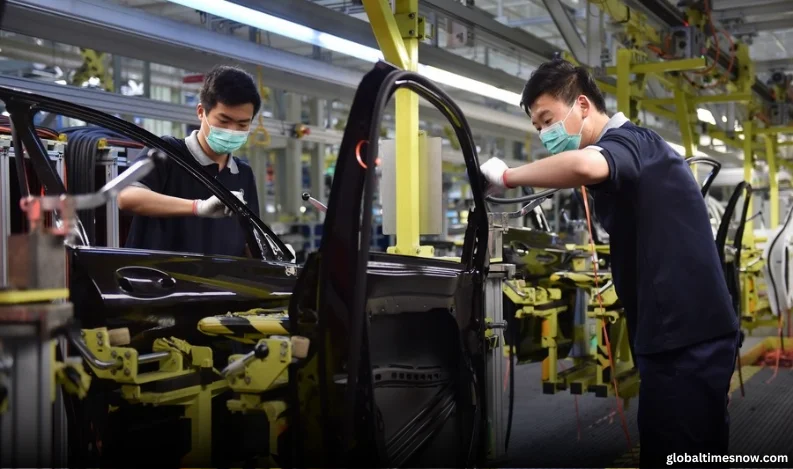China’s economy showed signs of modest recovery at the start of 2025, with retail sales and industrial production posting better-than-expected growth, according to data released by the National Bureau of Statistics (NBS) on Monday.
Retail sales grew 4.0% in January-February compared to the same period last year, up from 3.7% growth in December 2024 and aligning with market expectations. Meanwhile, industrial production climbed 5.9%, exceeding analysts' forecast of 5.3% but slowing from the 6.2% expansion recorded in December.
Fixed asset investment also showed improvement, rising 4.1% year-to-date, surpassing economists’ expectations of 3.6% growth and marking a significant jump from 3.2% in 2024.
Government Stimulus Measures Drive Economic Activity
The NBS attributed the economic rebound to China’s sustained stimulus policies but acknowledged lingering challenges, including external economic uncertainties, weak domestic demand, and operational struggles for businesses.
“The foundation for a sustainable economic recovery is still unstable,” the agency warned in a statement.
The latest figures come amid Beijing’s renewed efforts to stimulate domestic consumption. On Sunday, Chinese policymakers unveiled a broad economic roadmap, emphasizing initiatives such as stabilizing the stock market, introducing childcare subsidies, and boosting tourism.
Although the plan lacks specific implementation details, economists view it as a step toward addressing China’s deeper economic issues, including sluggish income growth and an underdeveloped social safety net.
China’s Labor Market and Real Estate Sector Show Mixed Signals
While economic indicators paint a mixed picture, China’s urban unemployment rate rose to 5.4% in February, the highest in two years, suggesting continued labor market challenges.
Meanwhile, China’s property sector remains under pressure, though signs of stabilization are emerging. Data released Monday showed that new home prices fell 4.8% in February year-on-year, a smaller decline than January’s 5.0% drop. Additionally, real estate investment declined 9.8% year-on-year, an improvement from the 10.6% drop in December. Analysts suggest that government-led credit support for cash-strapped developers is beginning to have a stabilizing effect.
Growth Target Remains a Challenge Amid Global Headwinds
China’s leadership has set an ambitious economic growth target of around 5% for 2025—a goal that analysts say will be difficult to achieve given rising U.S.-China trade tensions and deflationary pressures in the domestic economy.
Fu Lingui, spokesperson for the NBS, admitted in a press conference that meeting this year's GDP target "will not be easy." Economists widely believe that stronger policy support will be necessary to counteract weakening exports, which contributed nearly a quarter of China’s GDP in 2024.
Adding to concerns, China’s consumer price index (CPI) fell into negative territory in February—marking the first time in over a year that inflation has dropped below zero. In response, Beijing revised its annual inflation target down to "around 2%", the lowest in more than two decades.
Expanding Fiscal Support Amid Economic Slowdown
To boost economic activity, Chinese leaders announced an expanded fiscal package earlier this month, including an additional 300 billion yuan ($41.5 billion) in ultra-long special treasury bonds to support household subsidies. However, economists argue that direct consumer-targeted stimulus remains limited, with current policies focusing more on business investment and infrastructure rather than direct household spending.
Looking Ahead: Will Beijing Provide More Stimulus?
While China’s early-2025 data suggests gradual recovery, economists warn that uncertainties remain, and policymakers may need to introduce additional stimulus measures to sustain momentum and achieve this year’s ambitious growth target.
Investors will now be closely watching China’s next policy moves, as well as global economic developments, to assess whether the world's second-largest economy can sustain its fragile recovery.























